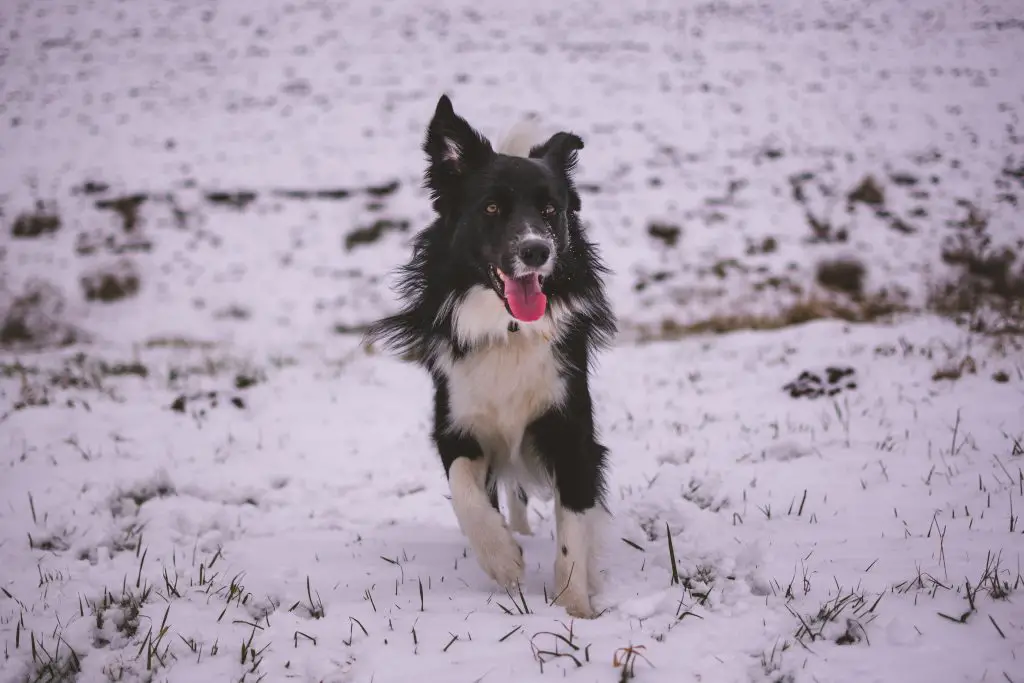Having a Border Collie that is susceptible to food allergies can be somewhat frustrating because you don’t know what to feed and what not to feed. One of the difficult situations is the guessing game of where the allergies came from and by trial and error where you determine one food is the culprit. This is can pose a potential threat to your Collie’s health. Fortunately enough, vets and expert dog nutritionists have found the common Border Collie allergies.
Although it’s a long and difficult process, and some allergies are hard to detect at early stages. This article will help identify common food allergies and how to prevent and fight them.

5 common border collie food allergies
Chicken – The common source of food allergens is chicken, particularly proteins. Chicken, along with beef and lamb are the most common ingredients of dog foods that have the possibility to become a primary source of the food allergen. So you must opt for other meat ingredients or you can just select fish-based protein.
Eggs – This is possibly due to genetic problems. Dogs can inherit allergies and one of that food allergen is eggs particularly the egg yolk. If left unnoticed, your dog might have difficulty breathing, swelling, or hives. So, make sure to check the contents of any dog food products first.
Wheat – Have you noticed that there are high-quality dog food products that say “grain-free” or “gluten-free” on the label? Because most dogs suffer from grain allergies which can develop into serious health problems. Luckily, most top brands are aware of this condition allowing them to alter the ingredients in their dog food.
Dairy products – Another common allergen is dairy products. Some symptoms of food allergies are mostly in the skin but some react through the digestive tract. Although it’s not really an allergen but more lactose intolerance because sometimes you can’t distinguish its condition.
Soy – Soy is a common food allergen too. If left untreated it may lead to hypersensitivity especially when they drink or eat that contains soy. The hypersensitive response can result in pruritus, distress, and itching. If your dogs fall in this category, it’s time to consult with your vet and weigh some other options.
Signs of common border collie food allergies
Excessive itching, dull coat, red underbelly
With these signs, it can possibly indicate that your dog has a food allergy. Excessive itching and other symptoms like the mentioned above are the most common reaction when dogs have allergies in food or seasonal. This can lead to hair loss, skin inflamed areas. If you see these signs, better figure out what’s the root at an early stage for better prevention.
Diarrhea
If you have seen your dog’s constant pooping with watery texture after eating, it’s probably a sign that your dog has food allergies on whatever food you fed into it. Sometimes this is largely due to dairy product intake and even wheat and soy. Also, vomiting, stomach upset, and other gastrointestinal issues are possibly closely linked to food allergies. Better watch out for this because it may be a symptom of an anaphylactic reaction.
Runny or watery eyes
Runny or watery eyes are not just a common dog health problem. There are some cases that it might lead to food allergy or pollen allergy, whatever seems to be the case, it must be prevented as early as possible. Sometimes, there’s an underlying problem in runny eyes which can lead to a serious problem. To know these further, consider consulting with your local vet in order to have a detailed treatment plan. You don’t want to lose the eyesight of your cute Collie, right?
Swollen face
A dog with swollen is not just any normal swell. You may think it’s only an insect bite or sting. While this might be true, in that case, it should be given attention to it as this may lead to anaphylaxis. Moreover, this can be the result of pollen allergens reacting into the dog’s body.
Itching ears
It could be a yeast build over time that causing your dog’s chronic ear infections. This is due to food allergies. If you notice there’s a coffee grind like dust in the dog’s ear, it could be ear mites or caused by food allergen reactions. This could be very irritating to dogs and they can have wound due to scratches. If you notice your dog being uncomfortable and reacting as if it’s irritating, especially if it’s wheezing, then you should take action and find out what’s the cause.
How to prevent common Border Collie food allergies
Check the ingredients first
Don’t be enticed by the dog food’s glamorous packaging or fall into advertising tricks. One of the most common mistakes for some dog owners is that they are just buying dog food without even checking the contents of the ingredients, its special features, an exemption, or important notes on the label. This can be quite alarming and you are putting your dog in a risky situation. You never know that what you bought contains chicken, yet only to find out that your Collie is allergic to chicken. Not only do you waste money, but you also become an irresponsible owner.
Also, check the package if it has grain-free, no fillers, and preservatives. You can normally spot this in the high-end dog food. Moreover, you must look for any AFCO statement on the label of the dog food. Check each label and look for the details because this will give you clue to prevent you from buying inappropriate dog food for your precious pooch.
Consider buying dog food that has rich in vitamins and minerals
Border Collies need the right amount of vitamins and minerals to support the immune system and for their body to function well. This is also a helpful nutrient to combat allergens from reacting too much when triggered. Furthermore, the food allergens always target the skin which leads to infections, hair loss, sores, and bleeding.
What you need is to consider selecting kibble food that has included more vitamins and minerals to support healthy skin and coat, fight digestive issues, and prevent any hair loss. Also, most dogs are allergic to some food which causes them to have skin problems and other sorts of conditions.
Discuss them with your local vet
The general rule is, if you don’t know what to do, always consult the experts. Your local vet is your best source of information and guides to help solve your dog’s food allergies. They will help you to sort out and specifically identify the root cause of your dog’s allergy. In some cases, commercial dog foods are the reason why your Collie acquire allergies. As a result, they can give you a proper prescription of dog food that is not accessible to the market.
Clean your surroundings
There’s no better way to prevent allergies to become worse when you have clean surroundings. It’s super cheap and it can also save the life of your Border Collie. Change the air filters regularly, clean the corners of your house, clean your dog’s space, and have a dehumidifier. These little things can worsen your dog’s allergies. As much as possible, keep them from rooms that are susceptible to mold buildup.
Strengthen your Collie’s immune system and gut health
The immune system and the gut health are the defendants of the dog’s overall health. They are the gatekeeper of bad bacteria ad foreign cells that could possibly harm your pooch. Consider buying them a dog treat supplement. Sometimes the supplements are packed with high nutritional value rich in vitamins and minerals for the improved immune system and gut health. Allergic reactions and gastrointestinal issues are alleviated when your pooch takes supplements regularly.
Choose a kibble food with specific protein sources
There is vast option to choose from when picking the suitable dog food such as salmon, tuna, duck, chicken, turkey, venison, lamb, and other. If your dog has an allergy to one of these selections, you can narrow down your selection. Although it can be a long and tedious process as it involves trial and error, that’s how you eliminate and figure the root cause. Or, you can just choose to go with your vet.
To be specific, here are some great options to consider when buying dog food:
Hypoallergenic dog treats
This type of dog treats are generally safe for the allergic dog and can be found in most pet food stores.
Grain-free dog food
Grain-free dog foods are an excellent choice for sensitive dogs who are susceptible to rye, corn, wheat, and barley. This type of food is always gluten-free. However, not all gluten-free are also grain-free. Choose a decent quality kibble with nutrient-rich plus vitamins and minerals all in one so you can save money from buying supplemental dog food.
Prescription dog food
Not readily available on the market and it can only be attained through the prescription of veterinarians. If your Border Collie needs special attention with its food, this can be the final option for your pooch. This can be pricey because of the special formulation of dietary needs carefully curated by vet nutritionists. It’s also a trial and error with a few bucks to spend.
Limited ingredient dog food
Top brands such as Blue Buffalo, Taste of the Wild, Merrick, ORIJEN, to name a few have a specially designed product that is a limited ingredient. This is becoming more popular because of how successful it can stave off allergens that are present in many canines. Usually, the top brands feature a “complete and balanced” diet for dogs along with the Association of American Feed Control (AAFCO) stated on the labels. These labels ensure that it’s safe to eat for dogs depending on the food allergen.
Or… you can make a special homemade dog’s meal
This makes more sense and more healthy for your dog. Making a homemade diet for your dog is a great option because you can control your dog’s dietary needs and select a specific food. At least you know what kind of food your dog is eating. The only downside is if you didn’t take any consultation before making a homemade meal plan. It’s also risky because you are just basing on your own without any guidance from the authorities. That said, it’s best to seek advice first and then make your homemade dog food.
Commonly Asked Questions
What’s the best treatment for common border collie food allergies?
There’s no better way than to avoid any of the food that causes your pooch to have an allergy. It’s always important to closely examine and observe the food to avoid and food to eat, you are will be smart enough to avoid such food that contains allergens. Although it’s hard to detect at first, there’s always the vet’s help to help you.
How are food allergies diagnosed?
The best way to know and identify the findings is through a process of elimination trial. By far this is the most accurate method wherein you can have a conclusion within eight to twelve weeks.
Final thoughts
These are just one of the common Border Collie food allergies. There are more food allergies, some have yet to be discovered, some are recently discovered. But, don’t be alarmed by the allergies, they are normal to dogs as it is normal for humans. What you should be alarmed about is when you disregard these symptoms that can lead to a serious problem.
Running out of shampoo? Try these excellent shampoo products that we have reviewed carefully to save you time.
Other source for detailed infos about Collies.


